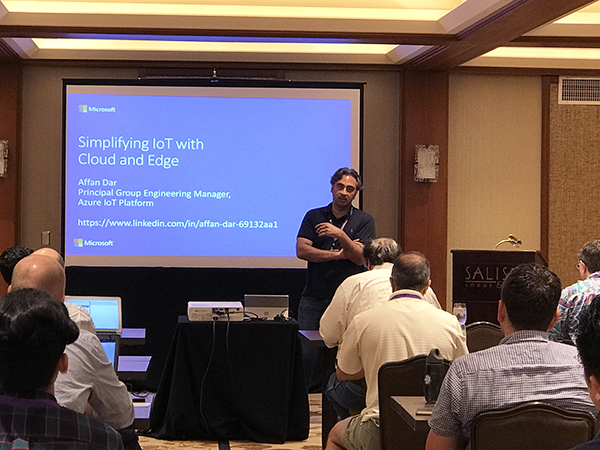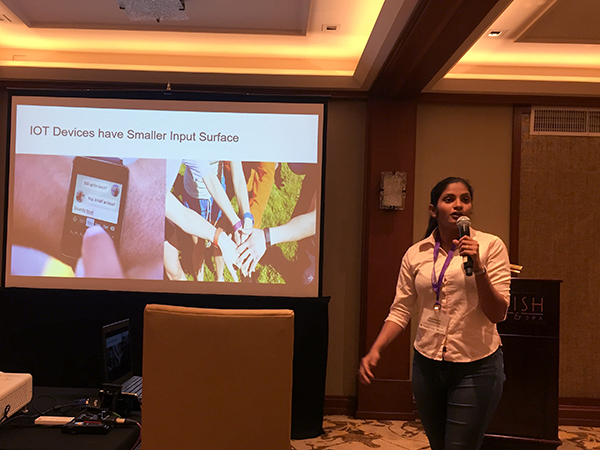
Affan Dar, Principal Group Software Engineering Manager for the Azure IoT Platform at Microsoft, delivers the opening keynote of the 2017 Summer Institute.
A group of leading researchers from academia and industry are gathered in Snoqualmie, Washington this week to explore the future direction of one of the fastest-growing areas of computing innovation: the Internet of Things. Organized by the Allen School and Microsoft Research, the 2017 Summer Institute: Unpacking the Future of IoT aims to foster new ideas, collaborations, and excitement around emerging technologies that will touch every part of our lives.
The Internet of Things is already having a profound impact on how we interact with the physical world around us — and with each other. Recent advances in hardware design, low-power sensing, wireless networking, artificial intelligence, and cloud computing have enabled computers to more easily gather and analyze data and react to changes in the physical world. This, in turn, has given rise to new devices and services that are altering the way we learn, work, and play. The global market research firm IDT estimates that, by the year 2020, the IoT market will reach $1.7 trillion and nearly 24 billion connected devices. That is more than double the current number of internet-connected smartphones, PCs, tablets, cars, and wearable devices combined.
“The Internet of Things is transforming multiple industries as we speak,” said professor Shyam Gollakota, one of the organizers of this year’s institute and director of the Allen School’s Networks & Mobile Systems Lab. “We have brought together some of the best minds in the world who are defining the business and research opportunities and influencing the direction of IoT.”

Allen School Ph.D. student Rajalakshmi Nandakumar, formerly a research assistant at Microsoft Research India, presents her work on interacting with devices using sonar.
The 2017 Institute has brought together these leading minds to discuss a range of topics that will help shape the future of IoT, including battery-free computing, backscatter communication, human-computer interaction, mobile sensing, edge computing, and security and privacy in relation to IoT technologies. By the end of the conference, participants will have a fuller understanding of the state of the art in IoT — and, organizers hope, be inspired to tackle the open research problems that must be addressed to move this exciting field forward. It will take industry and academia working together to realize the full potential of IoT.
“Together, we have worked hard to find a balance between industry and academic research priorities,” said co-organizer Victor Bahl, distinguished scientist and director of mobile and networking research at Microsoft Research in Redmond. “It has been a pleasure partnering with colleagues at UW whose perspective, ideas, and thoughtfulness have helped create an agenda that I am confident will make this an enlightening meeting for all participants.”
In addition to Gollakota and Bahl, the organizing team includes Allen School professors Joshua R. Smith, director of the Sensor Systems Lab; Shwetak Patel, director of the UbiComp Lab; and Tadayoshi Kohno, co-director of the Security and Privacy Research Lab. Participants in this year’s institute, which is by invitation only, include representatives of Amazon, Carnegie Mellon University, Disney Research, Imperial College London, MIT, the National Academy of Sciences, Pioneer Square Labs, Stanford University, and more.
This is the 22nd institute co-sponsored by UW and Microsoft Research. To learn more, visit the 2017 Summer Institute website here and read a related article on the Microsoft Research blog here. Also check out highlights of the conference program on Hamed Haddadi’s blog here.

